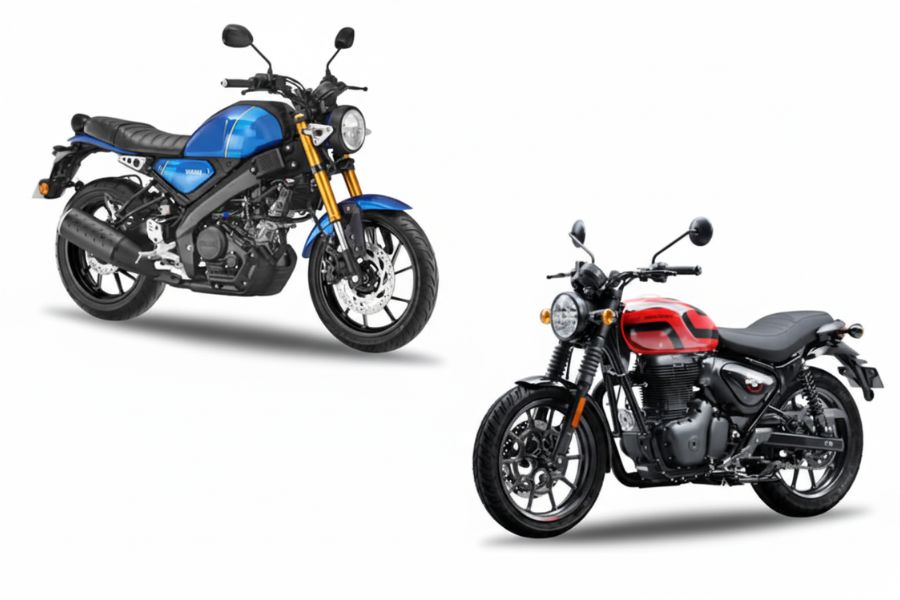Yamaha has finally introduced the much-anticipated XSR155 in India, positioning it as a stylish neo-retro roadster with modern engineering. Naturally, this puts it up against one of the most popular retro-style commuters in the country — the Royal Enfield Hunter 350. Both bikes appeal to urban riders with their classic silhouettes, but their mechanical DNA and riding characteristics couldn’t be more different. Here’s a detailed comparison to help you understand how they stack up on paper.
Engine, Power & Performance
Specifications Overview
| Engine & Output | Yamaha XSR155 | Royal Enfield Hunter 350 |
|---|---|---|
| Engine | 155cc, single-cylinder, liquid-cooled | 349cc, single-cylinder, air-cooled |
| Power | 18.2hp @ 10,000rpm | 20.4hp @ 6,100rpm |
| Torque | 14.4Nm @ 7,500rpm | 27Nm @ 4,000rpm |
| Gearbox | 6-speed | 5-speed |
| Power-to-weight | 132.8hp/tonne | 112.7hp/tonne |
Despite being much smaller in displacement, the XSR155’s liquid-cooled engine is a high-revving, performance-oriented unit borrowed from the R15. It thrives at higher rpm, delivers crisp throttle response and feels eager throughout the rev band. The 6-speed gearbox also allows it to maintain higher speeds more comfortably.
The Hunter 350’s long-stroke motor takes the opposite approach: low-end torque, relaxed delivery and a laid-back riding feel. While it produces significantly more torque, it does so at much lower revs, making it ideal for city commuting and leisurely cruising.
Weight, Dimensions & Practicality
Specifications Overview
| Dimensions | Yamaha XSR155 | Royal Enfield Hunter 350 |
|---|---|---|
| Kerb weight | 137kg | 181kg |
| Fuel tank | 10 litres | 13 litres |
| Wheelbase | 1325mm | 1370mm |
| Ground clearance | 120mm* | 160mm |
| Seat height | 810mm | 790mm |
*Yamaha has clarified the effective ground clearance is equivalent to the MT-15’s 170mm; the new certification measurements reflect 120mm on paper.
At 137kg, the XSR155 is dramatically lighter — over 40kg separates it from the Hunter 350. This weight advantage comes from Yamaha’s Deltabox frame and aluminium swingarm, which contribute to sharper dynamics and easier handling, especially for newer riders.
The Hunter, though heavier, offers a lower seat height and wider tank, making it accessible to a broad range of riders. Its higher ground clearance also helps navigate rougher patches of road.
Suspension, Brakes & Tyres
Specification Comparison
| Component | Yamaha XSR155 | Royal Enfield Hunter 350 |
|---|---|---|
| Suspension (F/R) | USD fork / Monoshock | Telescopic fork / Twin shock |
| Tyres (F/R) | 100/80-17 & 140/70R-17 (radial rear) | 110/70-17 & 140/70-17 |
| Brakes (F/R) | 282mm disc / 220mm disc | 300mm disc / 270mm disc |
The XSR155’s premium USD fork and monoshock setup offer better stability and feedback, giving it a sportier edge. Yamaha also equips it with a radial rear tyre for improved grip.
The Hunter uses a conventional fork with twin shock absorbers at the rear. Royal Enfield updated its suspension tune recently, and the bike now offers noticeably better comfort. Bigger brake discs compensate for its heavier build.
Features & Technology
Both motorcycles get dual-channel ABS, but Yamaha’s feature list is more modern overall.
Yamaha XSR155 highlights:
-
Traction control
-
Round LCD display with Bluetooth
-
All-LED lighting
-
Slip-and-assist clutch
Royal Enfield Hunter 350 highlights:
-
Tripper navigation pod (variant dependent)
-
Semi-digital instrument cluster
-
LED lighting (updated models)
-
Retro-styled design
The Hunter keeps things simple but functional, while the XSR leans towards a feature-rich, modern riding experience.
Price & Variants
| Price (Ex-showroom, Delhi) | Yamaha XSR155 | Royal Enfield Hunter 350 |
|---|---|---|
| Price | ₹1.50 lakh | ₹1.38 lakh – ₹1.67 lakh |
The XSR155 is offered in a single variant with four colour options. The Hunter, meanwhile, ranges across three variants: Retro, Dapper and Rebel.
While the base Hunter is cheaper, it lacks several modern features such as alloys, LED lighting and a rear disc brake. The Dapper and Rebel trims — which more closely match the XSR’s equipment — start at ₹1.63 lakh, making the Yamaha roughly ₹12,000 more affordable at that level.
Conclusion: Which One Should You Choose?
Both motorcycles carry a neo-retro appeal but cater to very different riding styles.
Choose the Yamaha XSR155 if you want:
-
A lightweight, nimble motorcycle
-
Modern features and technology
-
A rev-happy engine with sporty manners
Choose the Royal Enfield Hunter 350 if you prefer:
-
Strong low-end torque
-
A relaxed, urban-friendly ride
-
Broader variant options and customisation potential
A test ride on both is the best way to determine which machine suits your comfort, style and riding preferences.
Read More:

